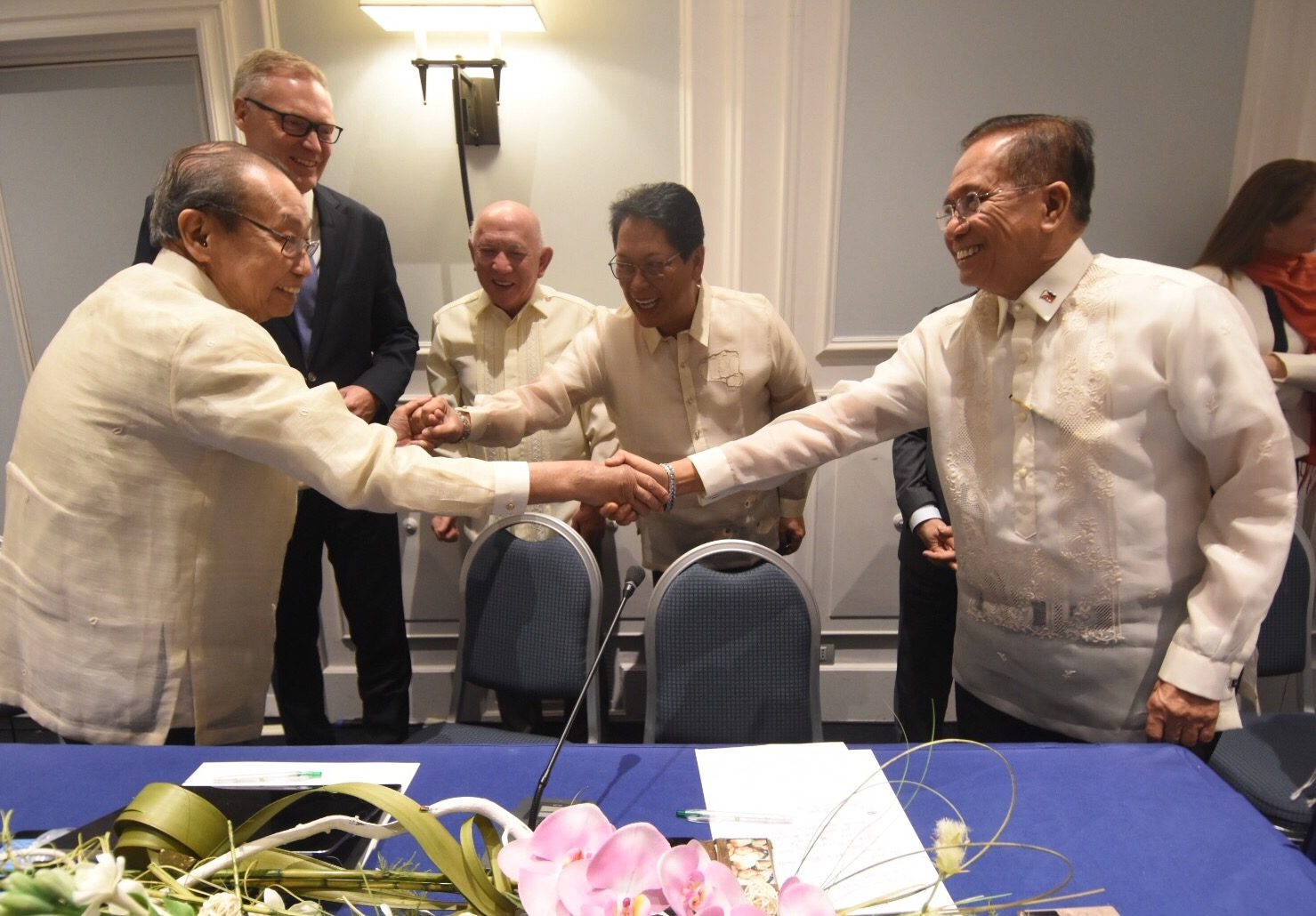SUMMARY
This is AI generated summarization, which may have errors. For context, always refer to the full article.

MANILA, Philippines – Talks to end Asia’s longest-running communist insurgency made significant headway in Rome, Italy, despite clashes on the ground and in the negotiating table, with the 2 opposite panels looking forward to the next round of talks in April.
The government and the communist National Democratic Front of the Philippines (NDF) submitted drafts on key reform proposals, signed side agreements to resolve contentious issues, and scheduled informal meetings to fast-track the completion of a peace deal.
The government panel also believe it averted the threat of the communist New People’s Army withdrawing its 5-month-old unilateral indefinite ceasefire declaration following the death of a New People’s Army (NPA) combatant in a firefight with state forces in North Cotabato over the weekend.
“It is more successful than I thought. Marami kami na-achieve ngayon (We achieved a lot in this round),” Coni Ledesma, panel member of the communist National Democratic Front of the Philippines, told GMA News in a Facebook Live interview during the closing ceremony held past 5 pm in Rome on Wednesday, January 25 (after midnight Thursday in Manila). It was delayed by 2 hours because of disagreements on the language of the joint statement.
The government panel also committed that they will facilitate request for the United States to remove Communist Party of the Philippines founder Jose Maria “Joma” Sison from its list of international terrorists to allow the leader of the revolutionary group to finally come home.
Sison, who participated in the talks in Rome, was absent at the closing ceremony. He was hospitalized Tuesday night, January 24, but is recovering well, said Ambassador Elisabeth Slattum, the Norwegian facilitator of the talks, during the ceremony.
CASER, CAPCR
A key development is the signing of ground rules for discussions on the Comprehensive Agreement on Socio-Economic Reforms (CASER).
Considered the “heart and soul” of the peace process, it envisions a roadmap to end widespread poverty in the Philippines by overhauling the country’s social and economic policies. The NDF is pushing for the free distribution of land, for example.
The government also submitted its draft on the Comprehensive Agreement on Political and Constitutional Reform (CAPCR). The NDF seeks to be a partner of President Rodrigo Duterte in forming his proposed federal republic.
CASER and CAPCR are the 2nd and 3rd, respectively, of the total 4 substantive agenda to be completed before a final peace deal is achieved.
The first substantive agenda, Comprehensive Agreement on Respect on Human Rights and International Humanitarian Law (CARHRIHL), was signed in 1998. Talks have been on and off for the last 3 decades.
The NDF said it sees the possible completion of CASER and CAPCR talks within the year, the shift to a federal system by 2018, and the signing of a final peace deal by 2020 after the successful implementation of CASER and CAPCR. (READ: NDF not ready to sign peace deal before 2020)
The Comprehensive Agreement on End of Hostilities and the Disposition of Forces (CAEHDF) is the final stage in the peace process.
Bilateral ceasefire deal
The panels failed to sign a bilateral ceasefire deal, which the government panel wanted to accomplish in Rome. It was originally scheduled for signing in October 2016 but it was repeatedly deferred because of delays in the release of 400 political prisoners.
But the NDF agreed to discuss the bilateral ceasefire deal next month, February, in The Netherlands after initially refusing to even calendar the issue.
Governent chief negotiator Secretary Silvestre Bello III believes that this development means both sides will hold the 5-month-old ceasefire – which the NDF threatened to withdraw – despite the clashes in Makilala, North Cotabato over the weekend.
“Otherwise, what’s the idea of discussing a bilateral ceasefire?” Bello said. Besides, he claimed that the lifting of the ceasefires because of the firefight in Makilala was never mentioned.
Bello argued the North Cotabato clashes underscore the urgency of signing a bilateral ceasefire agreement.
The military claimed they were running after an armed group extorting from local businessmen and didn’t know they encountered communist guerillas in Makilala. The NDF said the military was really hunting down communist rebels.
The proposed bilateral ceasefire deal imposes common rules for the military and the NPA in order to avoid misencounters on the ground. It will define hostile acts and determine buffer zones, for example.
Joint Monitoring Committee
The negotiators also activated the languishing Joint Monitoring Committee (JMC) that is supposed to monitor and investigate human rights abuses of security forces and communist rebels.
They signed supplemental guidelines that will make the JMC fully operational, thanks primarily to funding from Norway, the third party facilitator of the talks.
The JMC is a mechanism under the first substantive agenda of the peace talk, the CARHRIHL.
Rights group Karapatan claimed reporting up to 4,000 human rights violations committed by state forces since the administration of President Gloria Arroyo.
JASIG
The 2 panels decided to discuss the bilateral ceasefire deal in The Netherlands next month because they will really need to be there to deposit the identification documents of 87 rebel leaders who are to be covered by the Joint Agreement on Safety and Immunity Guarantees (JASIG).
These 87 rebel leaders will be immune from government arrest.
The list may only be opened when one of the names in the list is captured in order to verify that he or she, being an NDF consultant, should be released.
Bello will be able to verify that the NDF deposited actual list of names of its members in the underground. He will be given access to 5 random names in the JASIG list before it is deposited in a safety deposit box of a bank in The Netherlands. – Rappler.com
Add a comment
How does this make you feel?
There are no comments yet. Add your comment to start the conversation.